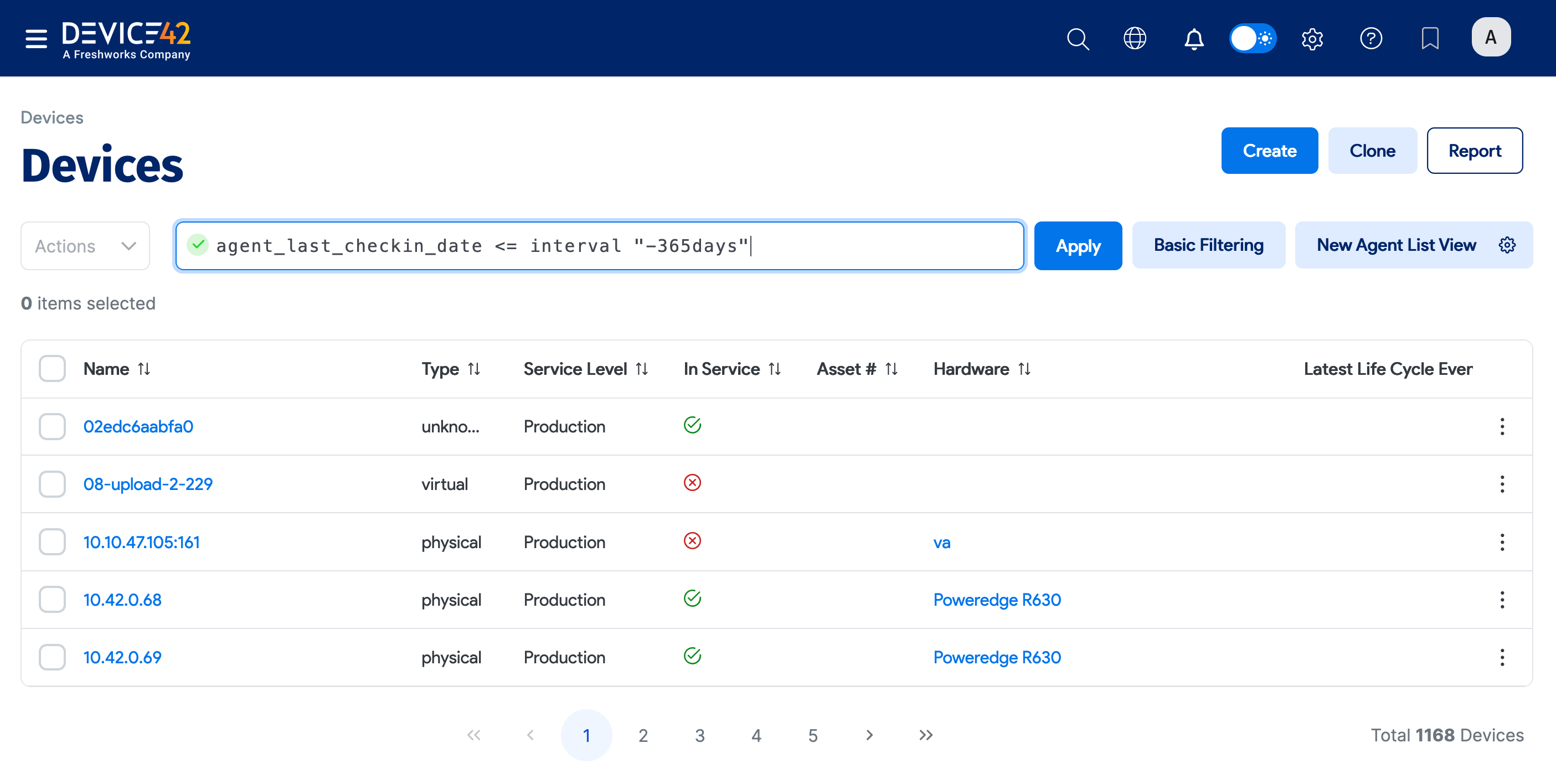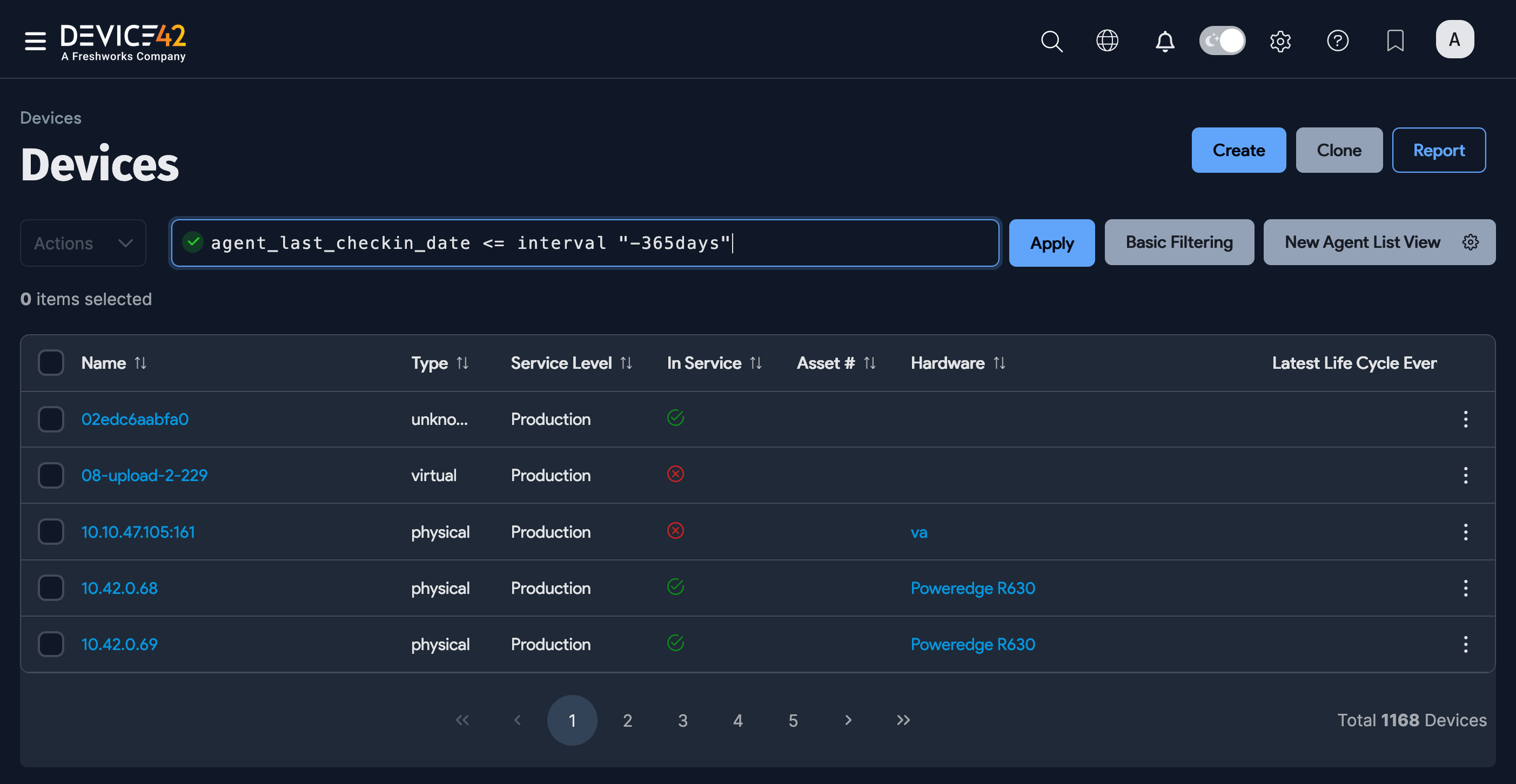Agent-Based Discovery
There are special situations where using an agent for discovery makes more sense. The IT environment may be unreachable from the network or security-hardened rules may be in place that limit traffic flow. Device42 offers many optional auto-discovery agents across several supported platforms.
As a best practice, we recommend using agentless discovery over agent-based discovery when possible. The information gathered is the same, but the agent does not support Resource Utilization (RU).
To learn about using the agent for offline discovery, see Agent-Based Offline Discovery.
Supported Platforms
Device42 autodiscovery agents are available for deployment on the following platforms:
- Windows 64-bit (Recommended)
- Windows 32-bit
- Mac - Intel
- Mac - ARM
- Linux 32-bit
- Linux 64-bit
- FreeBSD 32-bit
- FreeBSD 64-bit
- OpenBSD 32-bit
- OpenBSD 64-bit
- Solaris Sparc 64-bit
- Encrypted config file for Agent
See Windows Discovery Agent Service Wrapper and Mac Agent Service Launcher for information on installing versions of the Windows and Mac discovery agent as a service.
Do not set up an autodiscovery scan using critical or production account credentials. Please create a separate, dedicated account to use only for discovery.
Doing so, depending on permissions granted and configured password policies could result in account lock-out, therefore causing an otherwise completely avoidable outage.
Proxy Environment Variables
Proxy settings are not required, but if you need the agents to access your network via a proxy, you can set the following environment variables, which the agents will respect:
- HTTP_PROXY: Define the HTTP proxy server.
- HTTPS_PROXY: Define the HTTPS proxy server.
- NO_PROXY: A comma-separated list of IP addresses that should not go through the proxy.
On Windows, click the Environmental Variables button in the System Properties window to set environment variables.
Installation
Download the client from Discovery > Agent Based Scans. Enter the URL as it will be accessed by the agent from the remote machine, and choose your Platform from the dropdown: Windows, Mac, Linux, FreeBSD, and so on.
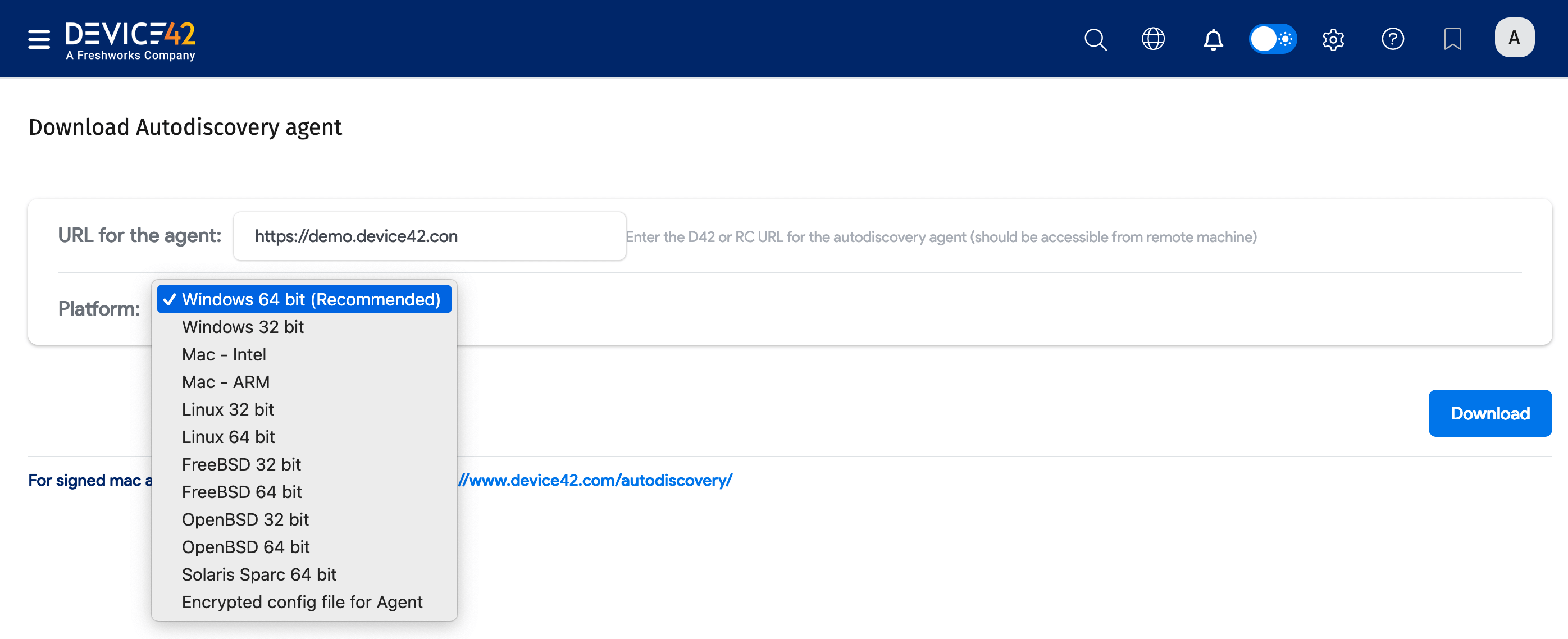
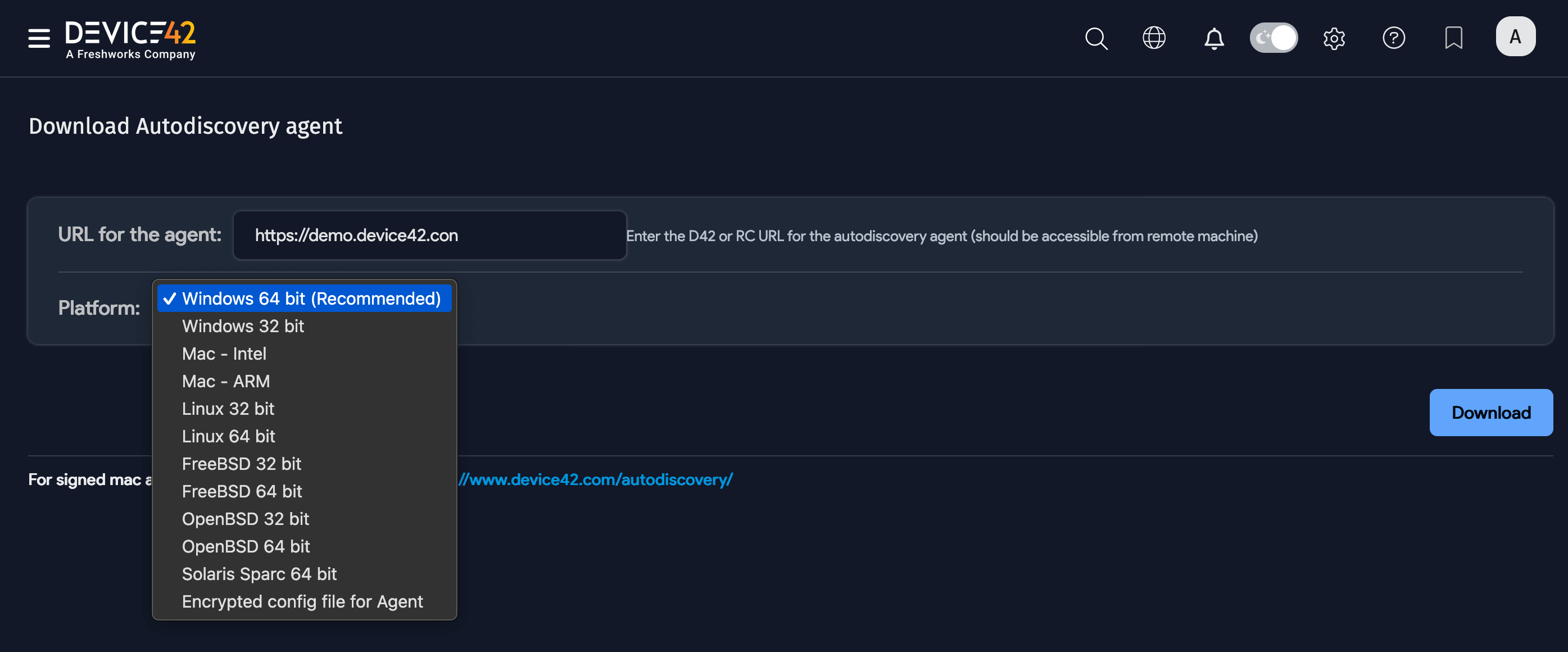
The agent can be run from the command line or can be scheduled using the relevant scheduling program per OS. When running the application, the following switches are available:
Click to expand the code block
-capture-host-files
capture hosts files
-config-file string
reads the config from an encrypted file (Only works for signed binaries. Ignored Otherwise)
-debug
prints the data being sent and result of post operation
-device-customer string
default device customer
-device-name-format int
1 - hostname, 2 - hostname + domain, 3 - hostname and hostname+domain as alias, 4 - hostname+domain and hostname as alias (default 1)
-device-object-category string
default device object category
-device-service-level string
default device service level
-device-tags string
default device tags
-discover-last-login
discover last login
-dry-run
doesn't do a post, just prints the data to be sent
-extended-logs
enables extended logs
-hostname-precedence
sets device name as 'new name' to prevent creation of new device if only hostname was changed
-ignore-domain
ignore domain
-ignore-ipv6
ignore IPv6 addresses
-ignore-local-ips string
sets list of local IPs to ignore
-ignore-local-ports string
sets list of local ports to ignore
-ignore-remote-ips string
sets list of remote IPs to ignore
-ignore-remote-ports string
sets list of remote ports to ignore
-ignore-subnets
ignore subnets
-ip-vrf-group string
default IP VRF group
-light-mode
reduces CPU utilization by cost of discovery speed
-new-device-object-category string
new device object category
-offline
doesn't connect with Device42, just prints the encrypted data to be sent
-prioritize-dns-name
Prioritize DNS domain name
-quiet
disables all logs
-service-ports-only
returns only service ports data
-skip-bios
disables bios discovery
-skip-cluster-info
disables cluster info discovery (Windows only)
-skip-cpu-info
disables CPU info discovery
-skip-database-info
disables database discovery
-skip-gpu-info
disables GPU info discovery
-skip-hardware-info
disables hardware discovery
-skip-hba
disables HBA discovery
-skip-hdd
disables HDD discovery
-skip-memory-info
disables memory discovery
-skip-mount-points
disables mount points discovery
-skip-network
disables network discovery
-skip-os-details
disables OS discovery
-skip-other-data
disables other data
-skip-parts
disables parts discovery
-skip-provider-unique-identifier
disables instance unique identifier lookup
-skip-serials
disables serial numbers discovery
-skip-service-ports
disables service ports discovery
-skip-services
disables services discovery
-skip-software
disables software discovery
-skip-tpm-info
disables TPM info discovery
-skip-virtual-machines
disables VM discovery
-software-initial-group string
default software group
-store-config-files
store configuration files
-sudo-password string
sudo password used in some OSes (Mac, Linux) to get information about the system
-use-global-ignore-software-file
use global ignore software file
-use-global-ignore-software-pattern-file
use global ignore software pattern file
-use-provider-token
use generated token to get instance info
-version
print version number and exit
Scheduling With Crontab in Linux
For best results, we recommend running the command with sudo. Make sure that /home/system\_dev42/bin/d42agent is owned by root with \-rwx—— (0700) permissions. This prevents the non-root user system\_dev42 from overwriting the agent or adding it to root’s crontab (or cron.daily/hourly) while allowing root to execute it.
Using a Limited Account
The Linux agent runs as root by default. However, it is possible to configure the agent to run with a limited, non-root account. Here's how you can create one:
-
Create a limited account:
-
Create a new Linux account (for example,
d42_limited) without root access. -
Disable login access to ensure the account cannot be used for remote shell access. Use the following command:
sudo useradd -r -s /usr/sbin/nologin d42_limited
-
-
Grant sudo permissions for required commands:
-
Assign the account permission to run the commands required by the discovery agent. Edit the
/etc/sudoersfile usingvisudo:sudo visudo -
Add the following entry to grant
d42_limitedaccess to specific commands:d42_limited ALL=(ALL) NOPASSWD: /usr/sbin/arp, /bin/cat, /sbin/ifconfig, /usr/bin/curl, /usr/bin/wget, /bin/ls, /usr/sbin/dmidecode, /usr/bin/lsof, /usr/bin/ps, /usr/bin/python3, /bin/uname, /usr/bin/systemctl, /sbin/ip, /usr/bin/df, /usr/bin/free, /usr/bin/mount, /usr/sbin/iptablesRead the Commands Required by the Discovery Agent section to see the full list of commands required by the agent.
-
-
Configure the file ownership and permissions:
-
Make sure that the
d42agentbinary is still owned byrootand has restricted permissions:sudo chown root:root /home/system_dev42/bin/d42agent
sudo chmod 0700 /home/system_dev42/bin/d42agent
-
-
Run the agent with the limited account:
-
Use
sudoto execute the agent with the limited account:sudo -u d42_limited /home/system_dev42/bin/d42agent
-
Commands Required by the Discovery Agent
Click to expand the code block
arp
cat
chkconfig
crontab
curl
df
dmesg
dmidecode
docker
dpkg
fdisk
find
format
getconf
grep
hdparm
hostname
ifconfig
ip
iptables
lsof
lsblk
lspci
mount
netstat
ps
python3
rpm
service
systemctl
uname
wget
We need to ensure the limited account can execute all these commands through sudo without requiring a password.
Here's a shell script that can be used to check whether the limited account has access to the commands:
Click to expand the code block
#!/bin/bash
# List of commands required by the discovery agent
commands=(
arp
cat
chkconfig
...
# Add the rest of the commands from the list above
)
# Check if the limited account has access to all the required commands
for command in "${commands[@]}"; do
sudo -u d42_limited command -v $command > /dev/null 2>&1
if [ $? -ne 0 ]; then
echo "Command $command not found or not executable by d42_limited"
fi
done
You can run this script to verify that the limited account has access to all the required commands.
Linux and Mac Note
After downloading the agent, make it executable by running the command chmod +x <agentname> and use sudo for best results. Use the command --sudo-password="password" to pass in the password.
You may experience an issue with opening the application on your Mac. If so, please use the following Apple support link to open a Mac app from an unidentified developer.
Windows Note
After downloading the agent, use the Windows Task Scheduler to schedule the executable file (*.exe) to run at the intervals you define.
View Agent Version and Agent Last Check-in Date
The Devices list page now includes two columns that display the Agent Version and the Agent Last Check-in Date for devices discovered by the agent.
-
On the Devices list page under Resources > Compute > All Devices, click the gear icon below the Advanced button to display the column list.
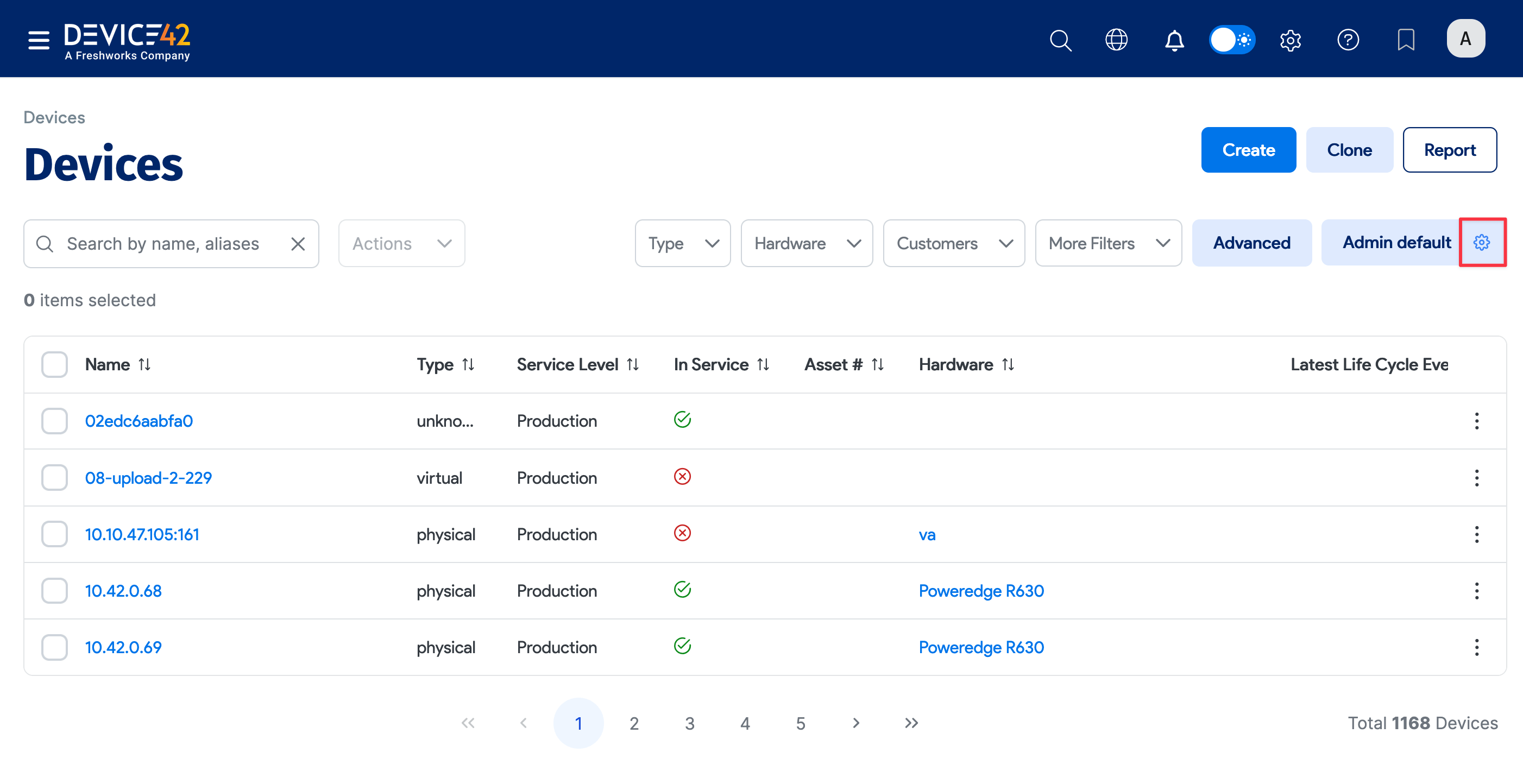
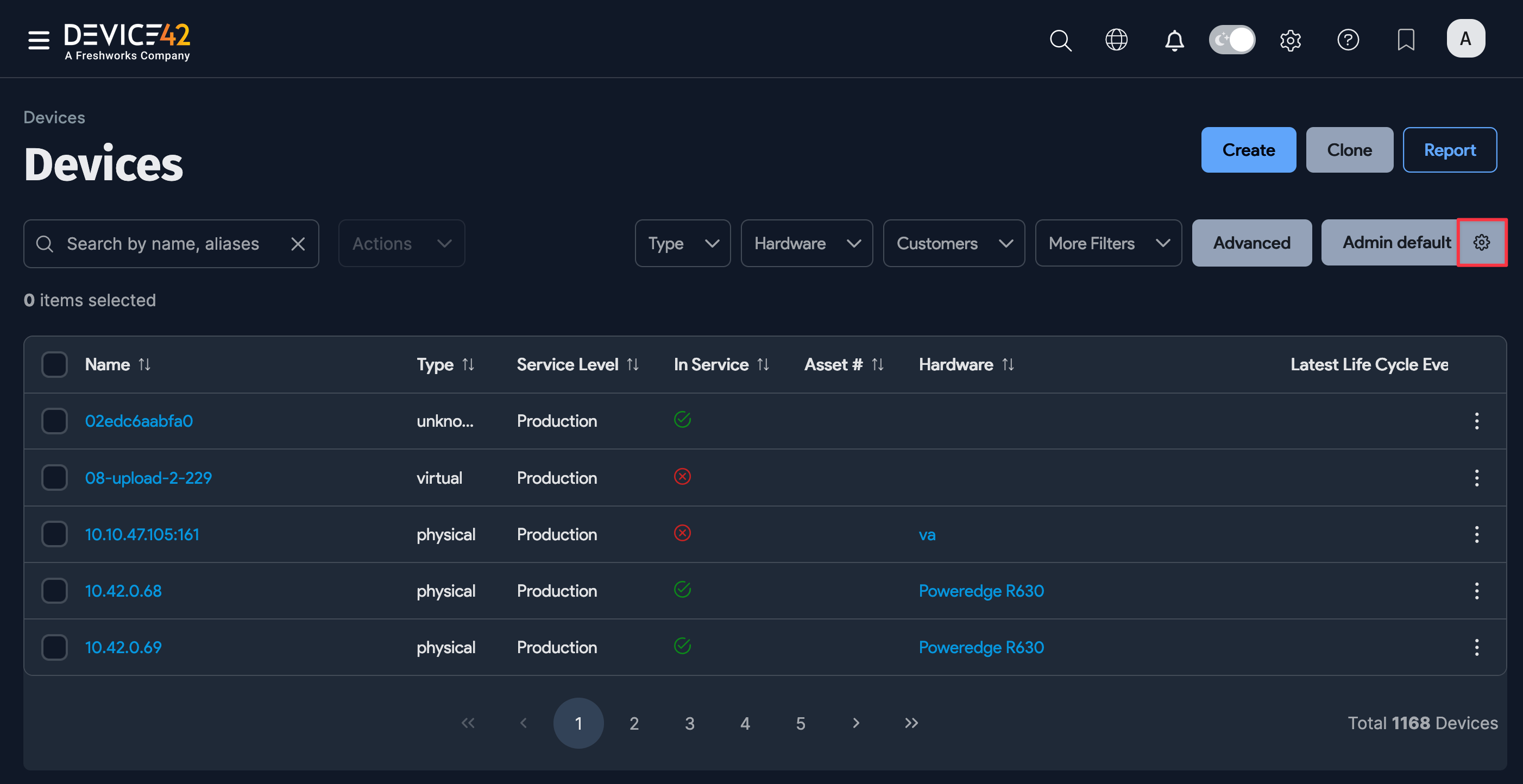
-
Select Agent Version and Agent Last Check-in Date from the Table Columns dropdown.
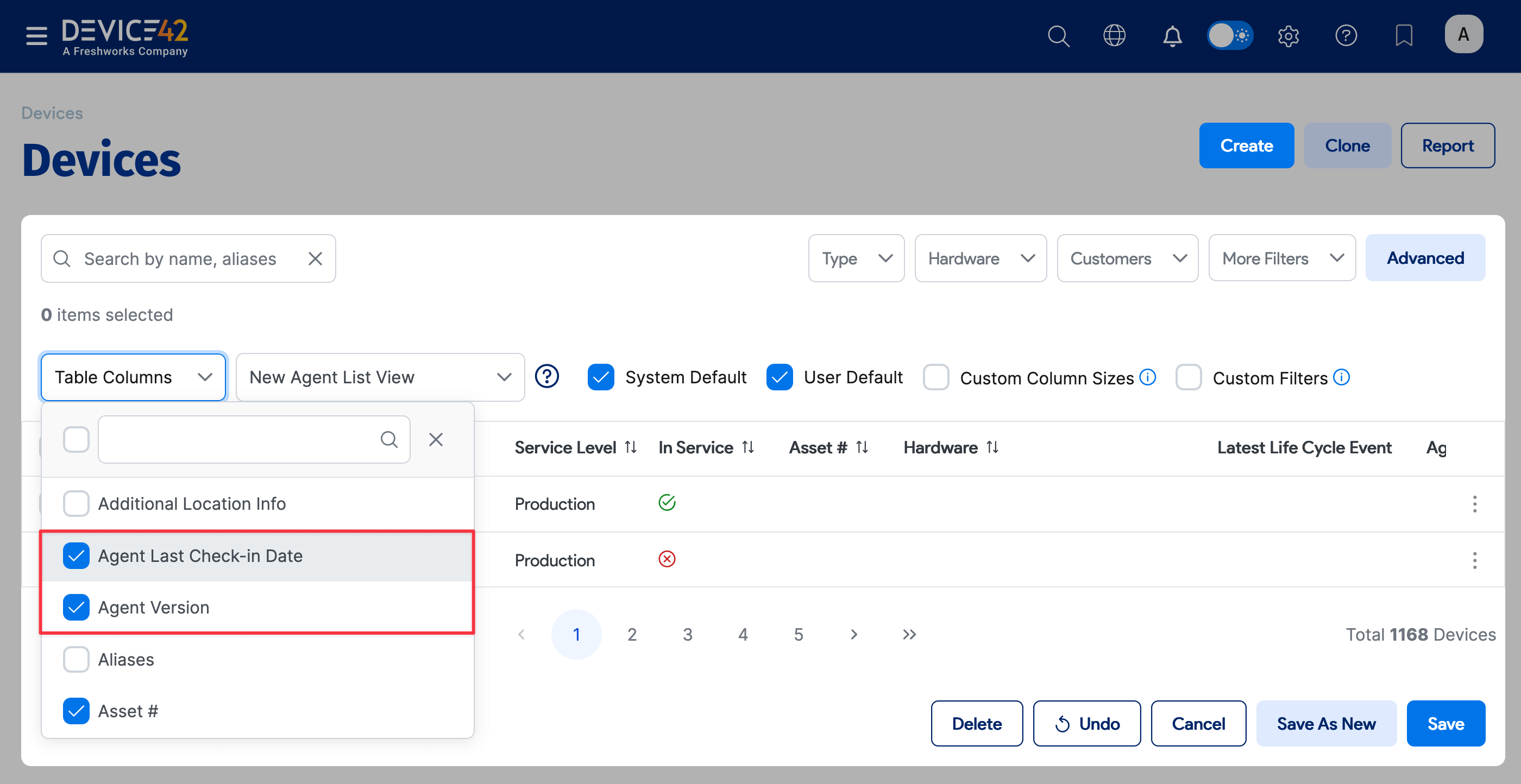
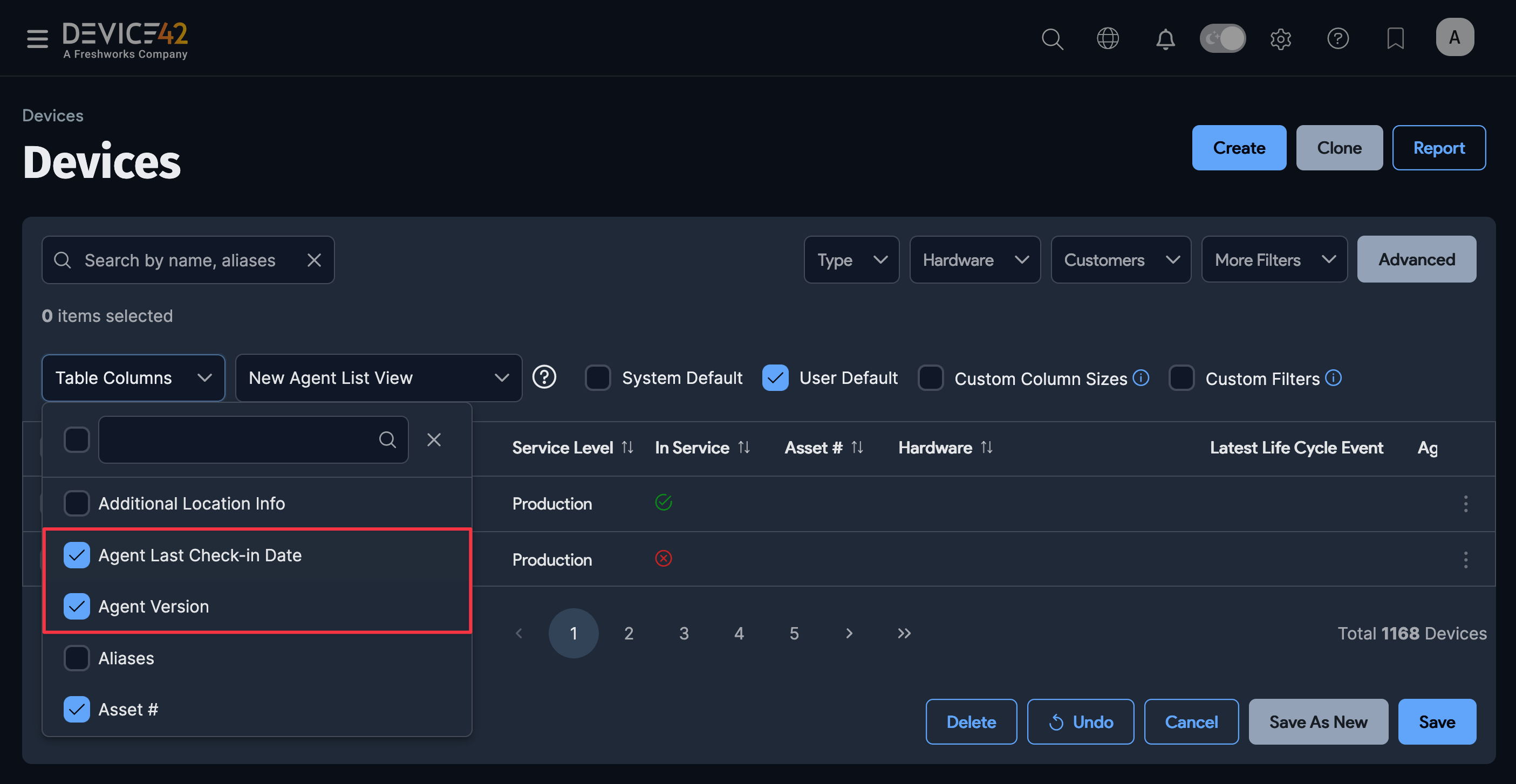
-
If you want to define a new column view, type a name for the view in the field to the right of the Table Columns dropdown and Save the view. Device42 displays the agent information for devices discovered by the agent.
Filtering with Agent Columns
You can use Agent Version and Agent Last Check-in Date to filter the devices list to look for devices found by specific agents or during certain periods.
-
Click More Filters to add the columns as search criteria.
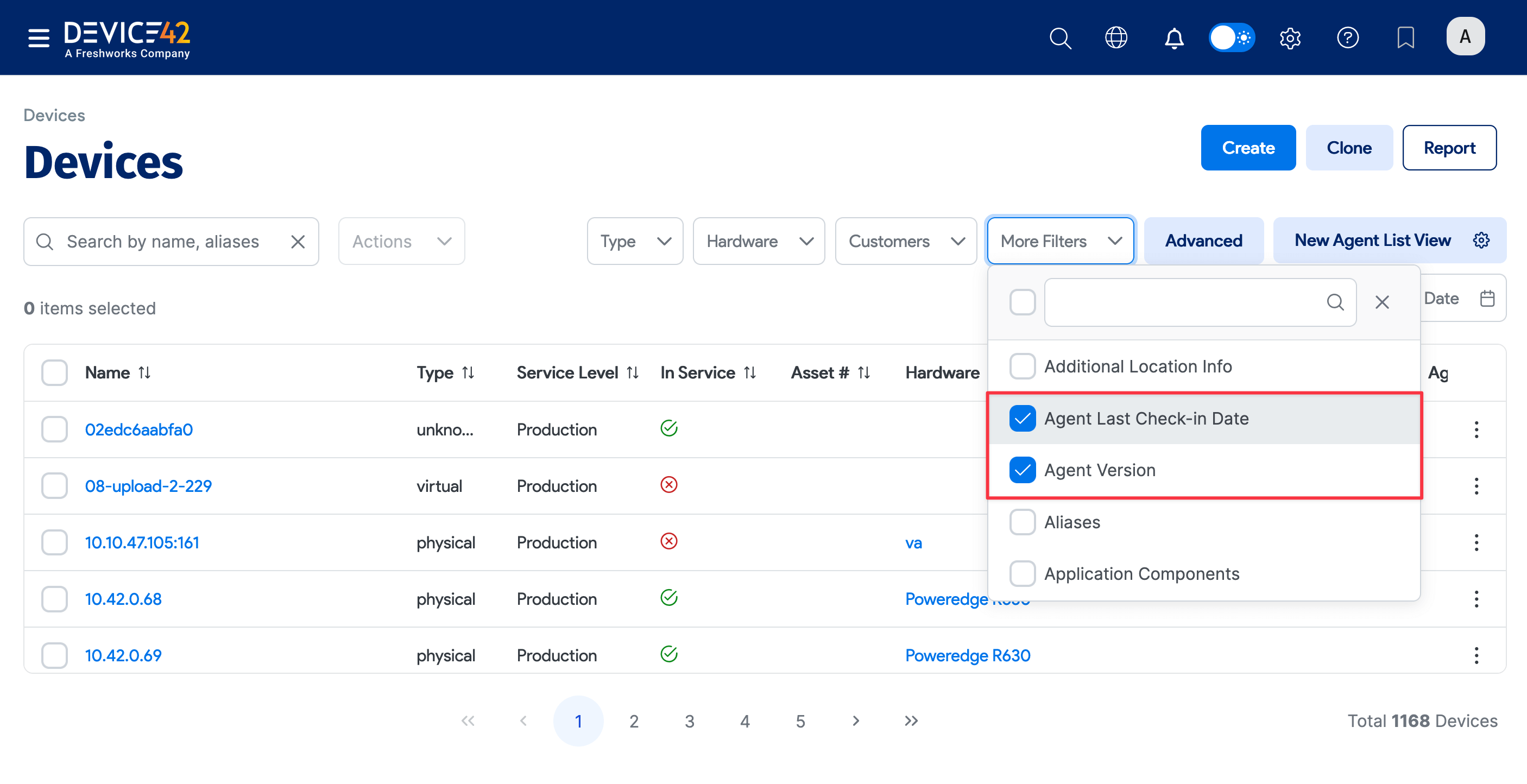
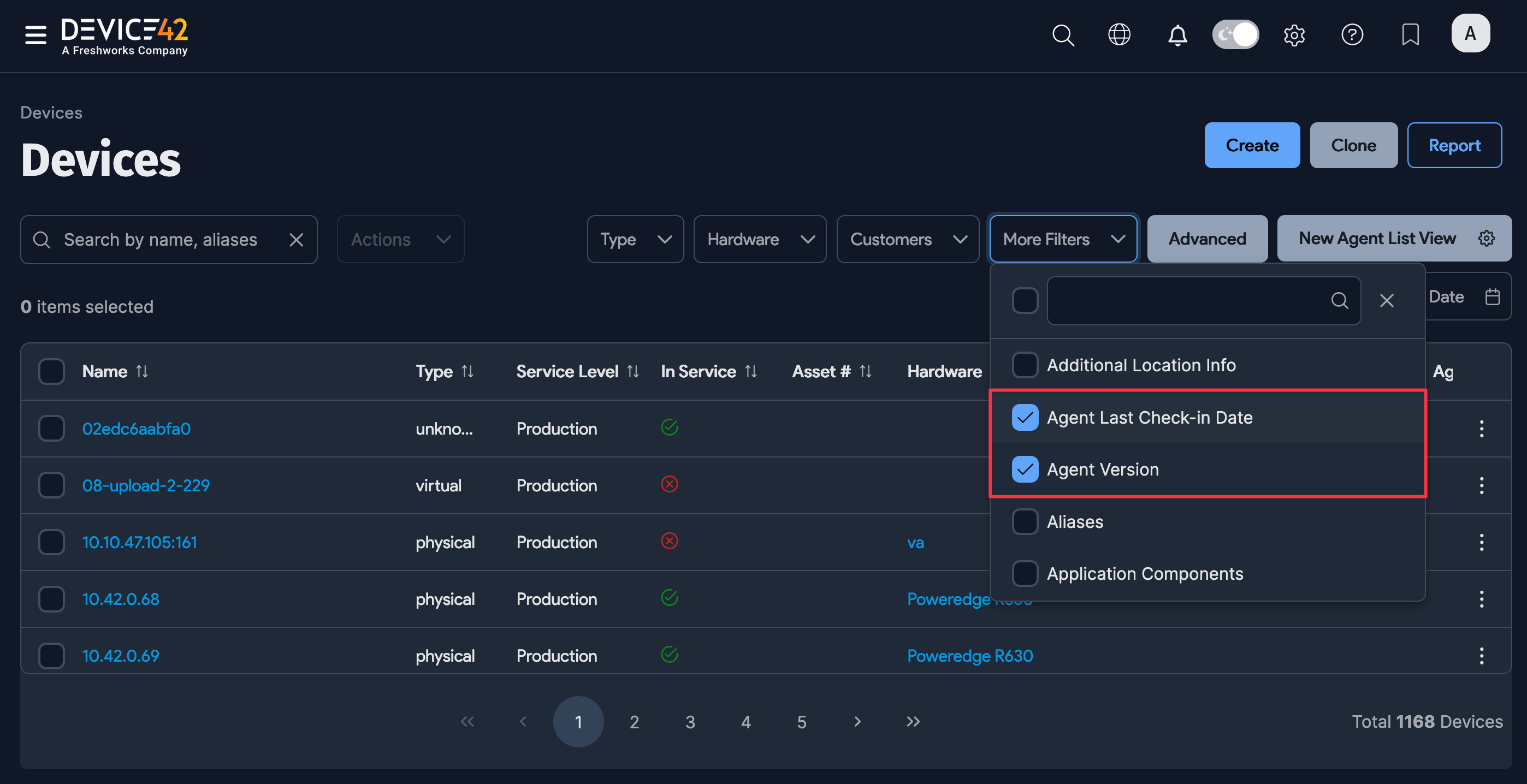
-
You can then click on the column name to use the column as a filter. For example, you can use Agent Last Check-in Date to search for devices discovered by an agent during a certain calendar period.
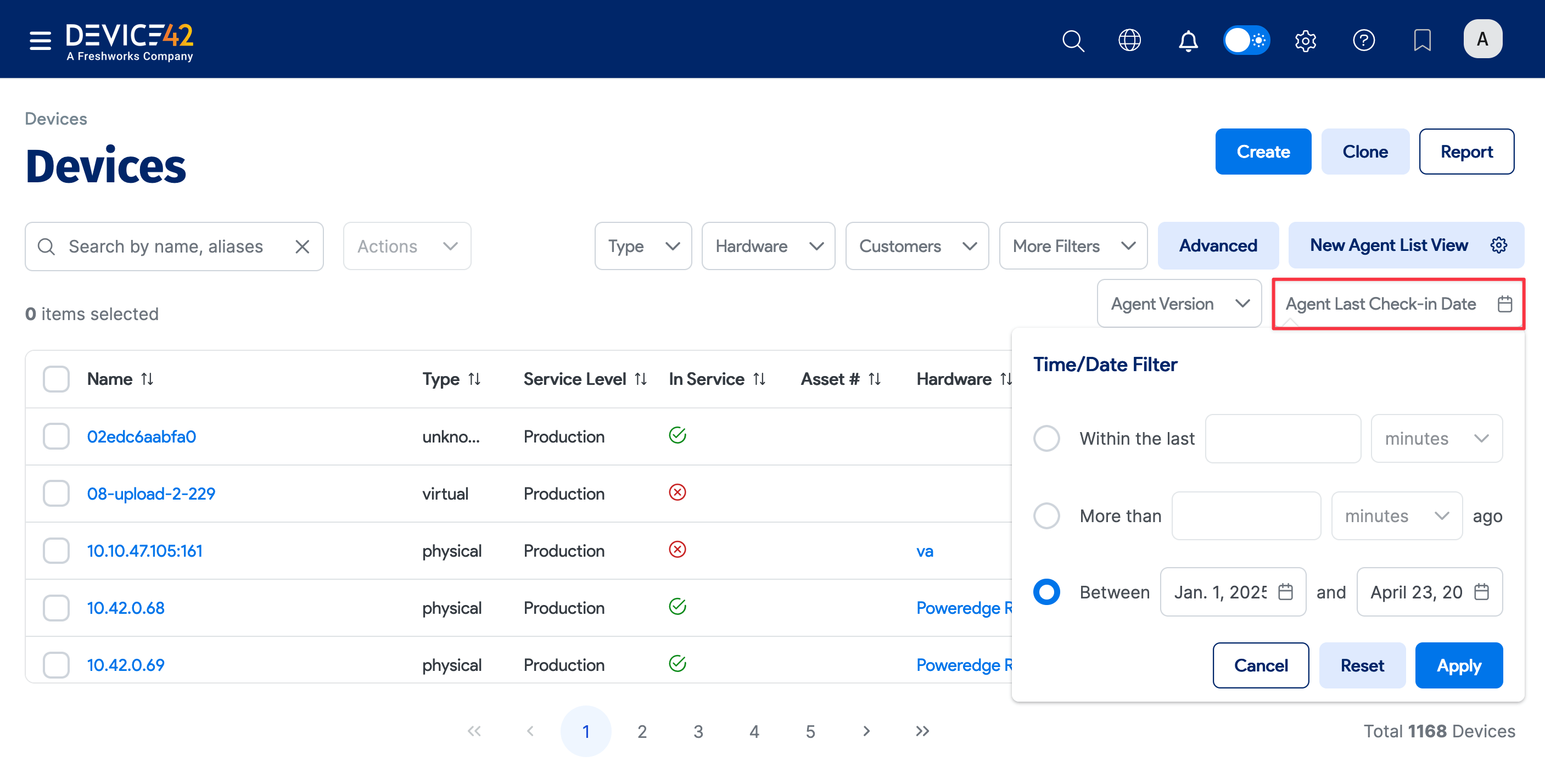
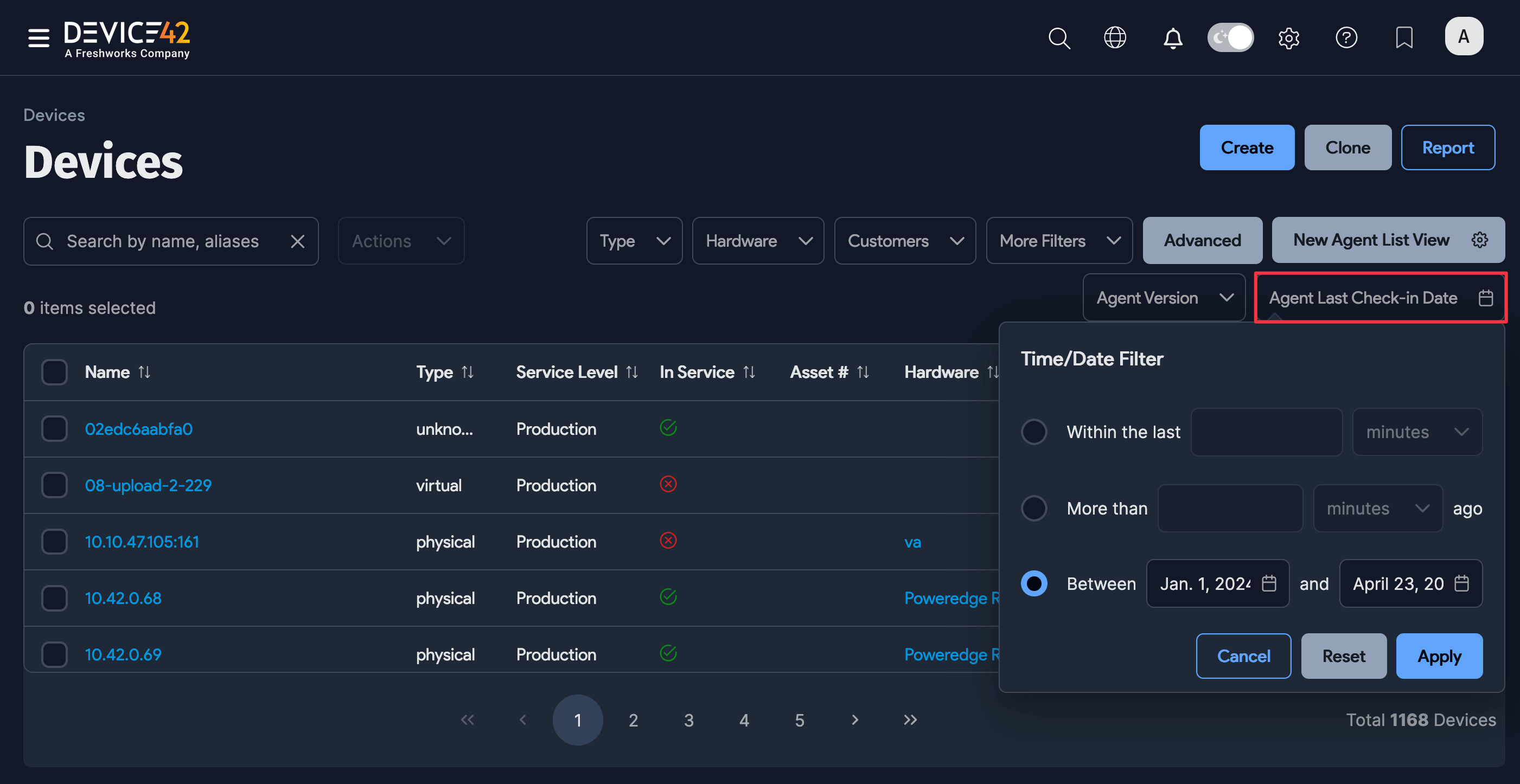
-
You can also use the agent columns in Advanced search. For example, the query below searches for devices discovered with a Agent Last Check-in Date less than 365 days ago.
